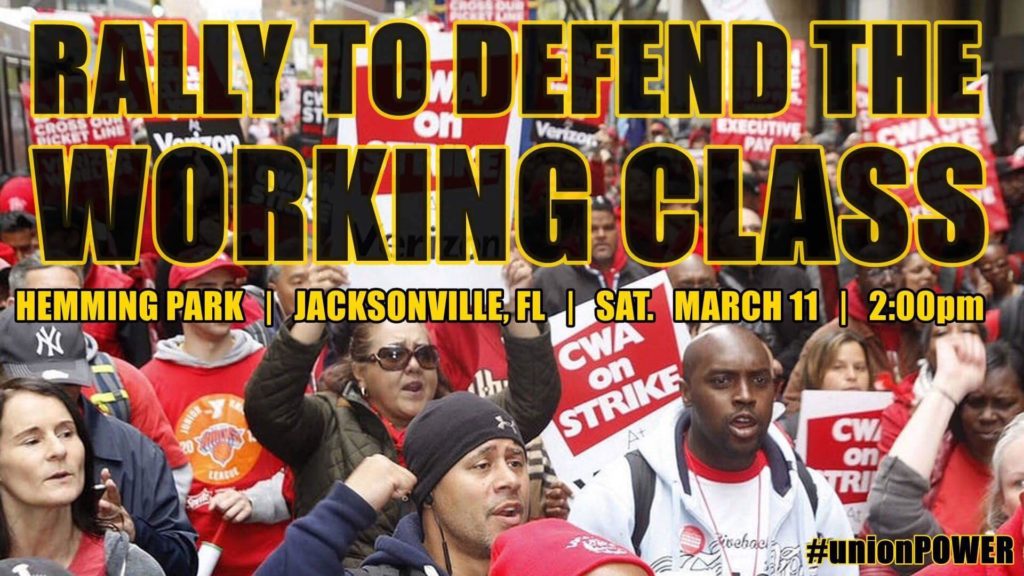On Saturday, March 11, workers, unions, the North Florida Central Labor Council and community groups across Florida will rally in downtown Jacksonville to defend the working class, which faces renewed attacks from President Donald Trump and the Republican-dominated Congress.
The organizers of the rally have put forward a six-point platform of demands for Florida Senators Marco Rubio (R) and Bill Nelson (D) and all the state’s congresspeople. The platform reads:
- Vote NO on National Right to Work, the Employee Rights Act, and any other legislation attacking unions and workers’ rights.
- Vote NO on the repeal of the Davis-Bacon Act.
- Vote NO on attacks on the collective bargaining rights of federal employees and public sector workers.
- Vote NO on federal vouchers for private and charter schools.
- Vote YES to protect workers’ pensions and NO to any cuts.
- Vote YES to expanding the rights of workers to form unions and collectively bargain.
The rally is the latest in a series of mass protests against the Trump administration and the GOP-controlled Congress. Trump’s presidency marks the beginning of a massive government-led employer offensive against labor unions, collective bargaining and workers’ rights.
National right-to-work legislation sits at the core of this offensive. On Wednesday, February 1, Republican congressmen Steve King of Iowa and Joe Wilson of South Carolina introduced national ‘Right-to-Work’ legislation (H.R. 785) in the U.S. House of Representatives. Within hours, President Donald Trump signaled his support for the bill, effectively green-lighting its way through the GOP-controlled House and Senate.
Right-to-work laws force unions to represent workers who refuse to join and pay dues. This gives workers a disincentive to join, since they receive all the benefits of union membership whether they pay dues or not. The effect is a net drain on union resources, which go towards representing non-members, and a weakened position at the bargaining table with employers.
Right-to-work laws came about in 1948, when an anti-labor coalition of Democrats and Republicans passed the Taft-Hartley Act on behalf of employers. This devastating piece of legislation outlawed solidarity strikes, restricted union activity and allowed states to pass so-called ‘Right to Work’ laws. Since that time, 28 states have enacted right-to-work legislation. The Bureau of Labor Statistics estimates that workers in these states make about $6000 per year less than workers in states where all workers in union workplaces pay dues.
Workers in Florida have seen the effects of Right-to-Work for decades. In 1942, Florida became the first state to enact Right to Work laws, and its effects on workers continues to this day. The Sunshine State ranks 31st out of 50 states in per capita income and has the 38th highest poverty rate. Income inequality is severe in Florida, ranking the fifth highest of all states, despite earning the nation’s fourth highest GDP.
Equally disturbing, Florida is the worst state for racial inequalities in household income, homeownership, poverty and education. Working women in Florida earned 19.8% less than their male coworkers in 2016. Without strong union contracts guaranteeing equal pay and benefits, these inequalities run rampant in Florida and all Right to Work states.
After the 2010 election brought a wave of Tea Party governors to power, employers successfully passed right-to-work laws in union strongholds like Michigan, Indiana and Wisconsin – and more recently in states like Kentucky and Missouri. But attempts to push right-to-work in the three strongest union states – California, New York and Illinois – have gone nowhere. With union membership at its lowest point since the Great Depression, employers hope to deal a mortal blow to the remaining unions and roll back the protections and gains made by working people.
The Rally to Defend the Working Class is an important step in Labor’s resistance to Trump’s 1% agenda in Florida. Organizers in the North Florida CLC and the Young Workers of Jacksonville hope to see similar Labor rallies in other cities in Florida and across the U.S.

